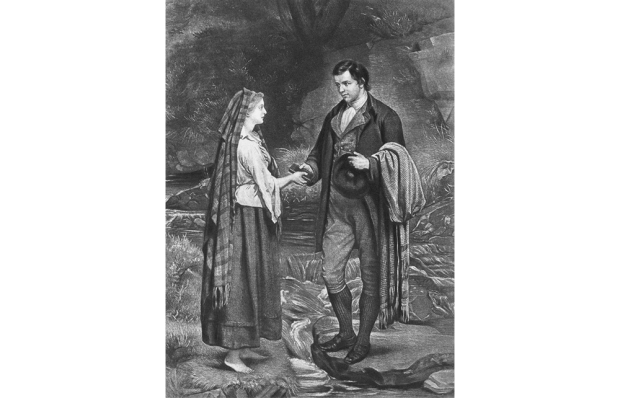In Competition 2818 you were asked to merge two literary classics and provide a synopsis of the new title.
You obviously had great fun with this one. Frank Osen came up with Pollyanna Karenina: ‘A girl from New England is so relentlessly upbeat about her affair with a Russian aristocrat that he throws himself under a passing train’; and A Dance to the Music of Time Management for Dummies: ‘This deluxe boxed set includes many helpful organising tips that will have you breezing through the 12-novel series in only a few hours.’ Mae Scanlan’s pun-packed blend of Henry Gray and Dorian Gray made me laugh, as did Sylvia Fairley’s Life of Roo. John O’Byrne’s Waugh-Mantel mash-up, Bring up the Vile Bodies, also warrants an honourable mention.
The prizewinners, printed below, are rewarded with £25 each; for the second week in a row, Chris O’Carroll romps home with £30.
In The Wonderland Delusion, co-authors Richard Dawkins and Lewis Carroll present an allegorical tale of a young girl’s coming of age as she learns to reject religious superstition and embrace scientific truth. The protagonist, Alice, falls down a deep hole into a topsy-turvy theocratic realm where science and reason are anathematised, and absurd doctrines are proclaimed as fact by insane authority figures who threaten to behead any rational thinker who dissents from their groundless beliefs. An evangelist gradually disappears as he delivers a sermon, until nothing is left of him but a vacant grin hanging in the air. A bishop in a ridiculously oversized mitre torments Alice with readings from a cate-chism of nonsense riddles, demanding, ‘How is a woman like a man’s rib?’ Dragged before a religious court to be condemned for heresy, she courageously liberates herself at last by exclaiming, ‘It’s nothing but a pack of lies!’
Chris O’Carroll
Dorian indulges in sado-masochistic practices involving whips, knives, and mysterious metallic implements, but maintains his air of innocent youthfulness as his painted portrait develops large bags under its eyes and a dazed, debauched look combining horror and mad concupiscence.
Robert Schechter (Fifty Shades of Dorian Gray)
Alienated and unfulfilled, a misfit teenager, rejected by his American private school, sets out on a quest to assassinate a French president who is on a visit to New York. Obtaining a sniper’s rifle and a new name (‘David Copperfield’) stolen from a birth index, he spends the night before the shooting attempting to lose his virginity by sleeping with a variety of partners, one of whom he throttles, and by driving extremely fast cars. Or is he an alienated teenager? After a fast, funny and colloquial face-off with his pursuers, and an inevitable shoot-out, he turns out not to be from the school at all, nor from America, nor particularly interested in France. This is the quintessential identity thriller, which will keep you on the edge of your seat, while wondering if your adolescence could also have been so hectically traumatic, if you’d put more effort into it.
Bill Greenwell (The Jackal in the Rye)
Winston Smith is an everyman figure living in a totalitarian state where Big Brother is always on television and every news bulletin is delivered in Newspeak. Although yet to be brainwashed, he knows the Thought Police are on his trail. One night, under cover of the sound of clocks striking 23, he escapes to an offshore island where a gaggle of war-weary combatants offer anarchic resistance to the mainland oppression. Among them are Corporal Corporal, a refugee whose brain was so shrunk in the wash that he functions only as a body, and Captain Yossarian, a cynic who shoots from the lip and has formulated Catch-84: ‘If you think you’ve been brainwashed, you haven’t — because brainwashing removes all thinking power; but that also means if you don’t think it’s happened, it has.’Faced with the choice between having his mind controlled or going crazy, Winston kills himself.
W.J. Webster (Catch-84)
A little girl dozing by the river spots a small, dapper, well-dressed white rabbit, chuntering away in a foreign accent, constantly babbling about his gloves, his moustache and his little grey cells. She follows it and falls down a rabbit-hole into a locked compartment on the Orient Express, where she finds a body with 12 stab-wounds, dead as a dodo. Letting herself out of the room with a magic key, she and the rabbit (the breed called ‘Belgian Hare’) consider the other travellers as suspects, including a duchess (with her cook and two footmen), a creepy opium-smoker, Father William, and a hatter whose behaviour is positively deranged. A young person with a cheesy grin keeps coming and going. In a shock twist, Alice finds herself briefly arrested and put on trial before the rabbity Belgian reveals who did it, and the whole house of cards collapses.
Brian Murdoch (Alice’s Adventures on the Orient Express)
The novel Lady Chatterley’s Doors of Perception is a daring exploration of sexual and psychedelic experimentation as avenues of transcendence, of escape from the limitations of quotidian physical and mental experience into a realm of heightened perceptions and ineffable cosmic awareness. The book traces a pilgrim’s progress undertaken by Connie, dissatisfied wife of a minor nobleman, when she commences a relationship with a mysterious shamanistic figure known only as Mellow, under whose tutelage she ingests mescaline and engages in a variety of erotic practices unknown to her staid husband. With each new step on her journey of sex, drugs and enlightenment, Connie becomes more attuned to the infinity that is inherent in every sensual and intellectual stimulus. A flower, a fold of fabric, a painting, a passage of music — each of these, no less than sexual climax itself, provides an ecstatic moment of spiritual communion with all that is.
Francis Harry
No. 2821: Georgic
You are invited to supply a poem that provides instruction or useful information. Please email entries (of up to 16 lines), wherever possible, to lucy@spectator.co.uk by midday on 23 October.
Got something to add? Join the discussion and comment below.
Get 10 issues for just $10
Subscribe to The Spectator Australia today for the next 10 magazine issues, plus full online access, for just $10.
You might disagree with half of it, but you’ll enjoy reading all of it. Try your first month for free, then just $2 a week for the remainder of your first year.













Comments
Don't miss out
Join the conversation with other Spectator Australia readers. Subscribe to leave a comment.
SUBSCRIBEAlready a subscriber? Log in